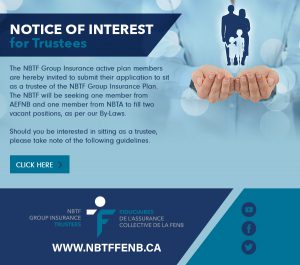// Transfers by Mutual Agreement and Surplus Situations
This is the time when school districts begin planning for the upcoming school year. Each year, the NBTF receives several questions regarding transfer requests.
Teacher-Initiated Transfer Requests
Article 45.06 of the Collective Agreement stipulates that “A transfer may be mutually arranged between a Superintendent or his/her designate and a teacher.”There are several reasons for wanting a transfer (e.g. closer proximity to home). Teachers have the right to request a transfer to another school, but the final decision remains at the discretion of the Superintendent of their District. This decision is often based on job availability, the needs and stability of the school or other factors. Since the decision rests with the Employer, other criteria may be applied, and seniority may not necessarily be taken into consideration.
Unlike some collective agreements, it should be noted that the Collective Agreement governing teaching staff does not allow for bumping. Teachers also cannot arrange their own transfer (e.g. if one teacher is prepared to exchange a job with another teacher). Regardless of the situation, the Superintendent reserves the right to grant a transfer or not.
In addition, assignments to grades and subjects are at the discretion of the school administration, and seniority is not necessarily a factor in making the decision. In the case of transfers, the district cannot guarantee the grades or subjects that will be assigned to teachers, since the decision rests with school administrators.
In the case where the district offers you a voluntary transfer, the final decision is yours. You are not obliged to accept the transfer being offered.
Surplus Situation at a School
When there is a surplus of teachers at one school due to a decline in the number of FTE (full-time equivalent teachers), the Employer will generally seek to make the greatest possible number of mutually agreed transfers. Accordingly, the District will send out a call for transfer requests to the teaching staff to make its preferences known. If there are enough mutually agreed transfers to meet the necessary staff moves, the problem is solved. It should be remembered that the decision to grant a transfer or not by mutual agreement is the Employer’s prerogative and seniority is not necessarily taken into consideration.If the number of requests for transfers by mutual consent is less than the number of transfers required, then the following provision of the Collective Agreement applies.
45.03 In any such case, the Superintendent or delegated designate shall transfer the teacher who has the least seniority in the School District before any other teacher in his/her school, providing the teachers to remain on staff are capable of satisfactorily fulfilling the requirements of the positions to be maintained in the school and providing the teacher to be transferred is able to satisfactorily fulfill the requirements of the position to which he/she is being transferred.
The word “satisfactorily” is important and requires clarification.
- The teacher must have a minimum of valid training and/or experience in the given subject.
- When the need arises, the onus is on the Employer to show that the employee cannot “satisfactorily” fulfill the requirements of the position; the employee with the greatest seniority has a right to the position even if a less senior employee is clearly more qualified.
- The establishment of qualifications for a given position or the school organization must not be used to defeat seniority rights.
- The Employer must make a fair assessment of the qualifications of any employee involved in a transfer or layoff situation.
- No adjudicator may intervene in the Employer’s decisions affecting teacher qualifications unless there is bad faith, discrimination or unless the decision is arbitrary and unreasonable. What is “satisfactory” in some situations is not necessarily so in other situations.
In the case of a teacher who is declared surplus and must be transferred to another school, the Superintendent can assign him or her to a job in the school district. However, it is understood that the Employer will make every possible effort to transfer the teacher within a reasonable geographic area.
Districts also have the option of placing B contract teachers into a temporary assignment (D contract). The accepting of a temporary assignment does not result in a teacher losing their B status and their school of record would remain at the school from which they were in a surplus situation.
There are other situations in which teachers may be transferred to another school, for example, in the case of a school closing.
If you have questions about transfers, contact the NBTF at 1-800-679-7044.
// Counsellors Enhancement Program
The Committee on the Professional Counselling Services Program (consisting of representatives from government, school districts, NBTF and NBTA) proceeded to allocate new resources for a period up to June 30, 2022.
On the anglophone side, this substantial investment, fully funded by Treasury Board and resulting from discussions between the NBTF and the Department of Education and Early Childhood Development, has doubled the specialized resources currently allocated to the wellness and counselling services for NBTA members.
We are please to welcome Carmen Meehan, Andy Stewart and Lisa Vienneau to the Teachers Counsellors Team!
For more information, please visit the NB Teacher Counselling and Wellness Program Website.
// Freedom of Expression
Freedom of expression is a fundamental right, but not one which is without limits.
The courts have established that the Employer has a right to expect fairness, integrity and loyalty from its employees. Teachers in turn can expect to be able to freely express their opinions on matters within their professional expertise.
It is recognized that teachers are professionals and their opinions on pedagogical and educational issues are valued. It therefore follows that teachers may publicly express their opinions in accordance with the following guidelines without fear of reprimand or discipline from the Employer:
- Teachers are free to publicly express their opinions on pedagogical issues and general classroom management. These opinions must be based on facts and expressed in a constructive and objective manner.
- Teachers may not act in ways or speak in words that would discredit or bring disrepute to the education system. This would be viewed as going further than what freedom of expression would allow and teachers could be advised to cease.
- Teachers must accept that they cannot rely on the fact that they may be speaking as parents or in any other capacity, and thus go beyond what they, as teachers, might be allowed to declare or do.
- Teachers must exercise caution when solicited to join a parental group that wishes to lobby the Employer on school closures, for example. Courts have stated that teachers cannot be protected by saying that they are acting as parents rather than teachers. However, nothing in labour relations would prevent teachers from expressing their concerns and worries to their Employer within the framework provided and in accordance with established procedures. For example, the local branch or liaison committee may become a mechanism for teachers to express their opinion on matters which are common to all the branch membership. Individually or through the branch or any other mechanism, the expression of concerns or of criticism towards a management decision is generally done privately between the teachers and management. If a teacher or a group of teachers wish to express discontent to the Employer in relation to a policy, this can be done by asking to meet with the district administration. In addition, if the subject being discussed is relevant to the Collective Agreement, there are procedures and mechanisms provided such as the provincial Employee/Employer Relations Committee, the local liaison committees or through a staff member at the NBTF.
Before contemplating any action or for more information on this matter, we would advise that you contact the NBTF at 1-888-679-7044.
// LAST CHANCE! Open Enrolment for Long-Term Disability Plan
60-Day Open Enrolment – If you are not currently enrolled in the LTD plan, you are to enroll in the plan without providing medical evidence from March 1 to April 30, 2021. This allows members who previously opted out of the LTD plan with a pre-existing medical condition the opportunity to re-enroll. Premium deductions will commence in May and your coverage will commence June 1, 2021.
Open Enrolment Limitations – If you have a pre-existing medical condition for which you have had any medical intervention during the period of December 1, 2020, to June 1, 2021, you will not be able to make a claim for this medical condition for a period of 24 months.
For more information regarding the change to the long-term disability plan, please click here.









